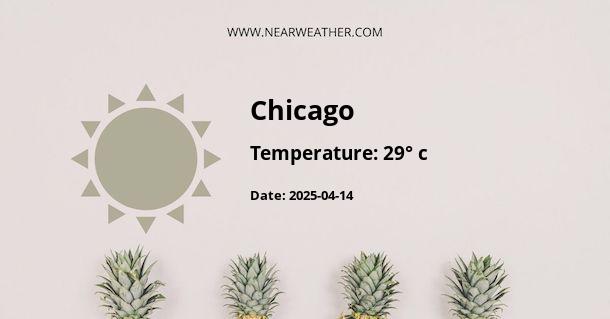Chicago, Illinois Weather and Climate
Chicago, located in the Midwest region of the United States, experiences a diverse climate with four distinct seasons. The city's climate is influenced by its proximity to Lake Michigan, which can lead to rapid weather changes and a phenomenon known as the "lake effect" during certain times of the year.
Seasonal Weather Patterns
Chicago experiences warm summers, cold winters, and relatively mild spring and fall seasons. Let's take a closer look at the weather patterns throughout the year:
Summer (June to August)
The summer months in Chicago are warm and humid, with average high temperatures ranging from 80°F to 85°F (27°C to 29°C). July is typically the warmest month, with temperatures occasionally reaching the low 90s°F (mid 30s°C). Thunderstorms are common during the summer, providing relief from the heat.
Fall (September to November)
Autumn in Chicago brings cooler temperatures and beautiful foliage as the leaves change color. Average high temperatures range from 55°F to 70°F (13°C to 21°C) in September, gradually dropping to 40°F to 50°F (4°C to 10°C) by November.
Winter (December to February)
Winters in Chicago are cold, with average high temperatures ranging from 30°F to 35°F (-1°C to 2°C). However, cold snaps can bring temperatures well below freezing, and the city occasionally experiences heavy snowfall and blizzard conditions, particularly in January and February.
Spring (March to May)
Springtime in Chicago is a transitional period, with temperatures gradually warming up after the winter chill. Average high temperatures range from 45°F to 60°F (7°C to 16°C) in March, rising to 65°F to 70°F (18°C to 21°C) by May. The city experiences occasional rainfall and thunderstorms during the spring months.
Extreme Weather Events
Chicago is prone to a variety of extreme weather events, including thunderstorms, tornadoes, and winter storms. The city is also known for its occasional heatwaves in the summer and bitterly cold Arctic air outbreaks in the winter.
According to the National Weather Service, tornadoes are a rare but real threat in the Chicago area, with an average of 10 tornadoes touching down within 50 miles of the city each year. However, the majority of these tornadoes are relatively weak and short-lived.
Climate Data
Let's take a look at some climate data for Chicago to provide a more comprehensive understanding of the city's weather patterns.
Annual Climate Data for Chicago
| Month | Average High (°F) | Average Low (°F) | Average Precipitation (inches) |
|---|---|---|---|
| January | 31 | 16 | 1.75 |
| February | 35 | 20 | 1.77 |
| March | 45 | 28 | 2.50 |
| April | 57 | 38 | 3.62 |
| May | 69 | 48 | 3.38 |
| June | 78 | 58 | 3.94 |
| July | 84 | 63 | 3.73 |
| August | 82 | 62 | 4.62 |
| September | 75 | 54 | 3.31 |
| October | 63 | 43 | 3.15 |
| November | 49 | 34 | 3.27 |
| December | 36 | 23 | 2.43 |
As illustrated by the climate data, Chicago experiences a wide range of temperatures throughout the year, with precipitation fairly evenly distributed across the seasons. This data can help individuals prepare for the varying weather conditions when visiting or residing in the city.
Conclusion
In conclusion, Chicago's climate offers a diverse and dynamic experience throughout the year, with each season bringing its own unique weather patterns. From the warm and humid summers to the cold and snowy winters, the city's climate provides residents and visitors with a true sense of all four seasons. Understanding the weather and climate of Chicago is essential for making the most of all the city has to offer, whether it's exploring its outdoor attractions in the summer or enjoying the winter festivities.
A - Chicago's Latitude is 17.799999 & Longitude is -88.300003.
A - Weather in Chicago is 29° today.
A - Climate Conditions in Chicago shows light rain today.
A - Humidity in Chicago is 60% today.
A - Wind speed in Chicago is 19.04 km/h, flowing at 81° wind direction. today.
